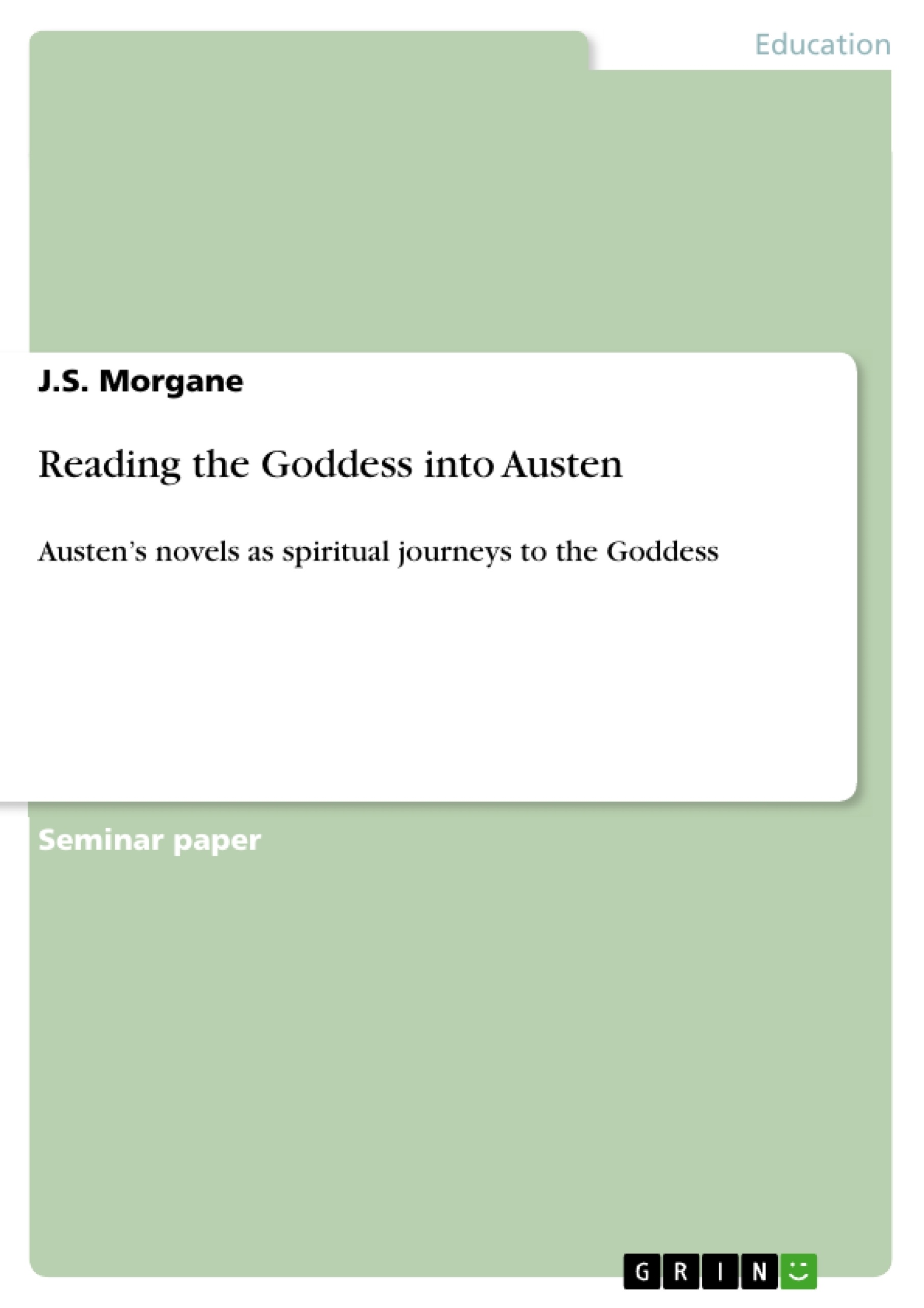The novel as the ultimate feminine genre, reading novels as a spiritual experience - this paper offers a brief look at Jane Austen’s novels and how they can be experienced as spiritual journeys into the realm of the Goddess. The paper will touch on the following topics: Providence; Romance and Realism; The Religion of the Novel; Austen and the Goddess; Reading Austen as a Spiritual Experience; Practising Mysteries.
Inhaltsverzeichnis (Table of Contents)
- Preface
- Introduction
- Providence
- Definitions of Providence
- 'And they laughed- the immortal gods'
- The Providence of God
- 'Hands that flung stars into space, to cruel nails surrendered'
- Jane Austen's Providence
- Problematic Endings
- Romance and Realism: A Reading
- Definitions
- Excerpt 'Persuasion': a mini-story
- Lady Russell: the Temptress
- Inversion of Social Power Relations
- The Matriarchal Vision
- Negotiating Realism
- The Religion of the Novel
- The Origin of The Novel
- The Trope of The Goddess
- Austen and the Goddess
- The Great Goddess
- Representations: Looking at the Picture
- Reading Austen as a Spiritual Experience
- Identification
- Identification and Devotional Prayer
- A Replacement for Religion
- Practising Mysteries
- Conclusion
Zielsetzung und Themenschwerpunkte (Objectives and Key Themes)
This paper explores Jane Austen’s novels as a counterpoint to patriarchal Christianity, highlighting how her works can be interpreted as a spiritual journey to the Goddess. It examines the concept of "providence" in Austen's writings and argues that her novels offer a feminine spiritual reading experience that can replace patriarchal Christian religious practices.
- The Novel as a Feminine Genre
- Providence in Jane Austen's Work
- Austen's Novels as a Spiritual Journey to the Goddess
- Reading Austen as a Replacement for Religion
- The Role of Realism and Romance in Austen's Novels
Zusammenfassung der Kapitel (Chapter Summaries)
The preface introduces the author's personal experience with Jane Austen and her works, highlighting her initial fascination with the characters and themes. The introduction outlines the paper's objective: to explore Austen’s novels as a challenge to patriarchal Christianity and offer an alternative spiritual interpretation. Chapter 3 delves into the concept of "providence" in Austen's works, examining its definition and application to her characters and narratives. Chapter 4 explores the interplay between romance and realism in Austen's novels, demonstrating how they can be interpreted through a feminist lens, highlighting the inversion of social power relations and the presence of a matriarchal vision. Chapter 5 examines the origin of the novel as a genre and its connection to the trope of the Goddess, setting the stage for the interpretation of Austen's works as a spiritual journey. Chapter 6 focuses on the concept of the Great Goddess and its representation in Austen's novels. Chapter 7 explores the idea of reading Austen's novels as a spiritual experience, emphasizing the concepts of identification, devotional prayer, and the potential replacement of religion.
Schlüsselwörter (Keywords)
The key themes and concepts of this paper include Jane Austen, the novel as a genre, providence, patriarchal Christianity, feminine spirituality, the Goddess, spiritual journey, realism, romance, reader-response criticism, and the interpretation of literature as a spiritual experience.
Frequently Asked Questions
How can Jane Austen's novels be seen as a spiritual journey?
Austen's works can be interpreted as a feminine spiritual experience that offers a counterpoint to patriarchal Christianity, focusing on internal development and matriarchal visions.
What is the concept of "Providence" in Austen's work?
The paper explores "Providence" not just as divine intervention, but as a narrative force that guides characters toward growth and moral resolution, often contrasting with traditional religious definitions.
What does "The Goddess" refer to in this context?
The "Goddess" represents a trope of feminine power and spirituality found within the structure of the novel, serving as a replacement for traditional patriarchal religious symbols.
Why is the novel considered a "feminine genre"?
Historically and structurally, the novel has provided a space for exploring domestic life, emotional depth, and social power relations from a female perspective.
How does Austen negotiate realism and romance?
Austen uses realism to ground her stories in social truth while employing romantic elements to explore the inversion of power relations and the fulfillment of female agency.
- Citar trabajo
- Dr.phil. J.S. Morgane (Autor), 2005, Reading the Goddess into Austen, Múnich, GRIN Verlag, https://www.grin.com/document/387815



